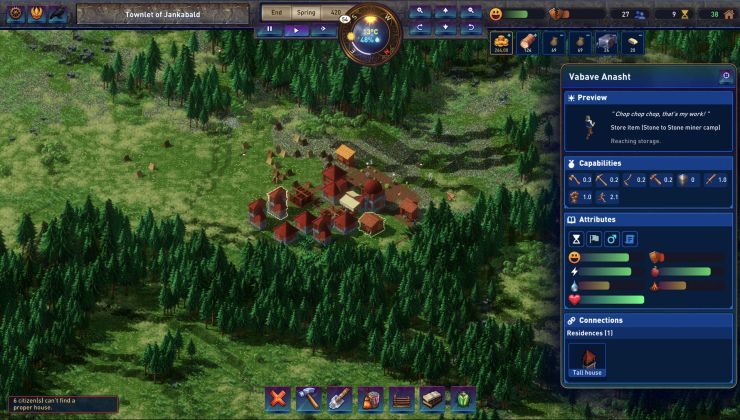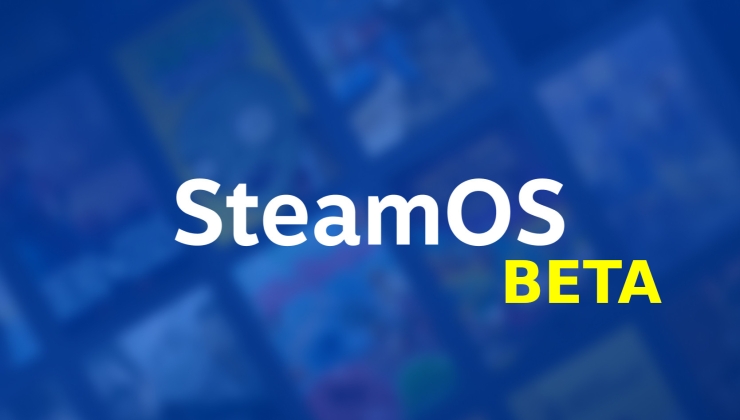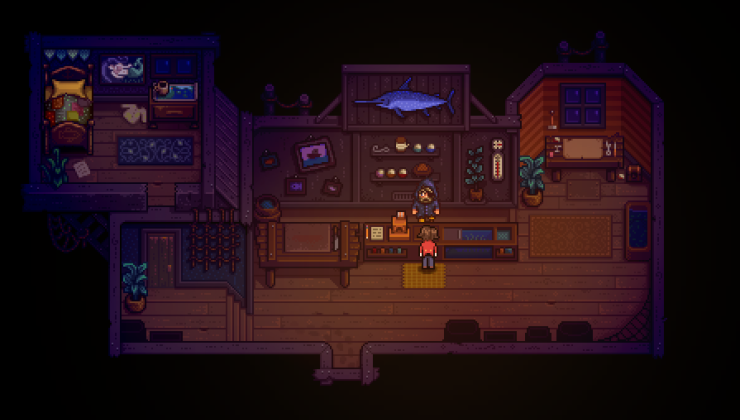A big one for Stellaris is here with the Stellaris: Galactic Paragons expansion launched along with the 3.8 "Gemini" patch for all players. Stellaris: Galactic Paragons expands the political system quite a bit with some new features, allowing for a fair bit more role-play with specialized abilities.
Here's what Stellaris: Galactic Paragons offers:
- Unique Council Roles: Specialized roles and benefits are included in Galactic Paragons to expand upon the new Council Mechanics in Stellaris! Find dozens of unique council roles based on your civics and government types, and unlock additional positions as your empire evolves.
- New Dynamic Leaders: Recruit, improve, and follow the leaders of your empire through the ages! You may shape them by picking their traits, selecting their veteran class, and guide them towards their destiny, up until they retire - or perish!
- Meet Galactic Heroes: Attract paragons of renown to your council: unique leaders with their own art, events, and stories may join your empire and bring their own benefits to your government. Or, discover four Legendary Paragons with intricate event chains and unique mechanics!
- New Traditions, Civics, And More:
- A new “Under One Rule” Origin that tells the tale of the leader who founded your empire
- Eight new Civics focused on leadership, from immortalizing the personalities of leaders past in digital archives to heavily optimized council selection via corporate charter
- 12 new Veteran Classes
- Hundreds of new Leader Traits
- Two new Tradition Trees, giving players new edicts and improved leaders
- New ships, art, and story content
Check out the trailer:

YouTube videos require cookies, you must accept their cookies to view. View cookie preferences.
Direct Link
Direct Link
The free 3.8 patch also brings with it the new co-op modes which sound very useful. The modes are classed as being in Beta, meaning there might still be some issues:
- Cooperative PvE allows players to join together to take on enemies as a single empire. This more relaxed gaming environment is conducive to teaching others how to play the game or dividing responsibilities of empire management.
- Cooperative PvP allows groups of players to join opposing empires and fight against each other. This division of duties may be less overwhelming and reduce barriers to entry for non-competitive players. For those who are more competitive, empires can also be locked and require a password.
The entire patch notes can be seen on the Paradox Forum. As usual they're quite extensive, with lots of overall improvements to many of the game's systems.
Stellaris is available from GOG, Humble Store and Steam.
Some you may have missed, popular articles from the last month:
All posts need to follow our rules. Please hit the Report Flag icon on any post that breaks the rules or contains illegal / harmful content. Readers can also email us for any issues or concerns.
6 comments
In its continuing quest to be every Paradox grand strategy game ever made (…in SPAAAACE!), Stellaris has taken more than a few pages out of Crusader King's playbook with its latest 'Gemini' update and DLC Galactic Paragons. This is huge. I played for an hour or so this evening, and wow does this update change the game.
Some updates/DLCs focus more on end-game stuff that you won't see for hours into a campaign (like becoming the crisis in Nemesis, or Colossi from Apocalypse). The leader and government changes in the Gemini update, in contrast, change your very first decisions of the game, and look likely to remain relevant all the way through the game. You now get to pick a trait for each leader when they level up, which instantly makes them 2000% more engaging; I had to unlearn my knee-jerk reaction of instantly dismissing the pop-up about a leader gaining a new level, because now they're actually interactive and interesting. Some traits are "council traits", which only give their effects when the leader is on your council, which makes choosing traits (and which leaders to put on the council) an interesting choice. Since leaders require more attention you'll also have fewer of them at once, at least in the early game before you increase your soft cap (no more 5+ exploring science ships in the first decade, and honestly, I don't think I'll miss it). It feels a bit more like an RPG, leveling up your party members to get better and better, and I quite enjoy it. I also like that you can further customize your starting leader with a trait (possibly more depending on starting choices?) and an optional biography if you want.
(As an aside, I love that they've gotten rid of scientists having two roles; they're only explorers now, save for whoever is your head of research, who acts as chief scientist for all three research branches simultaneously. The conflict between the two roles is much diminished now, since research-affecting traits are only council traits now from what I saw, meaning you only have to worry about one scientist dual-classing [and they can still command a science ship while being councilor].)
With the two additional tradition trees from Galactic Paragons (focused on producing better leaders, and the governing council specifically), I counted sixteen traditions tree to choose from in my game. For the first time since they were introduced all the way back in Utopia, I finally felt like I had to make hard choices about which ones to get, and I love it! Picking a new tradition tree shouldn't feel like a no-brainer, and there are enough now that I can actually feel like I'm giving something meaningful up by picking another one. The council has something new called Agendas which are empire-wide bonuses that take some time to enact, and different tradition trees (along with ethics, government type, etc.) give you different ones. It remains to be seen how well it works (they take long enough to enact that I only saw a handful in my time playing), but it seems like a decent system.
I didn't take the new origin, so I can't speak to it, though it sounds solid enough. (I have this weird habit of essentially playing the last expansion [or a least a previous one] whenever a new one comes out, hence my Ocean Paradise Angler Aquatics running a MegaCorps this time around. :grin:)
Some updates/DLCs focus more on end-game stuff that you won't see for hours into a campaign (like becoming the crisis in Nemesis, or Colossi from Apocalypse). The leader and government changes in the Gemini update, in contrast, change your very first decisions of the game, and look likely to remain relevant all the way through the game. You now get to pick a trait for each leader when they level up, which instantly makes them 2000% more engaging; I had to unlearn my knee-jerk reaction of instantly dismissing the pop-up about a leader gaining a new level, because now they're actually interactive and interesting. Some traits are "council traits", which only give their effects when the leader is on your council, which makes choosing traits (and which leaders to put on the council) an interesting choice. Since leaders require more attention you'll also have fewer of them at once, at least in the early game before you increase your soft cap (no more 5+ exploring science ships in the first decade, and honestly, I don't think I'll miss it). It feels a bit more like an RPG, leveling up your party members to get better and better, and I quite enjoy it. I also like that you can further customize your starting leader with a trait (possibly more depending on starting choices?) and an optional biography if you want.
(As an aside, I love that they've gotten rid of scientists having two roles; they're only explorers now, save for whoever is your head of research, who acts as chief scientist for all three research branches simultaneously. The conflict between the two roles is much diminished now, since research-affecting traits are only council traits now from what I saw, meaning you only have to worry about one scientist dual-classing [and they can still command a science ship while being councilor].)
With the two additional tradition trees from Galactic Paragons (focused on producing better leaders, and the governing council specifically), I counted sixteen traditions tree to choose from in my game. For the first time since they were introduced all the way back in Utopia, I finally felt like I had to make hard choices about which ones to get, and I love it! Picking a new tradition tree shouldn't feel like a no-brainer, and there are enough now that I can actually feel like I'm giving something meaningful up by picking another one. The council has something new called Agendas which are empire-wide bonuses that take some time to enact, and different tradition trees (along with ethics, government type, etc.) give you different ones. It remains to be seen how well it works (they take long enough to enact that I only saw a handful in my time playing), but it seems like a decent system.
I didn't take the new origin, so I can't speak to it, though it sounds solid enough. (I have this weird habit of essentially playing the last expansion [or a least a previous one] whenever a new one comes out, hence my Ocean Paradise Angler Aquatics running a MegaCorps this time around. :grin:)
2 Likes
Quoting: PhiladelphusIn its continuing quest to be every Paradox grand strategy game ever made (…in SPAAAACE!), Stellaris has taken more than a few pages out of Crusader King's playbook with its latest 'Gemini' update and DLC Galactic Paragons. This is huge. I played for an hour or so this evening, and wow does this update change the game.Um. I'm not sure what I think of that. I don't play 4X space games to be an RPG, I play them to explore the galaxy and manage economies and research mindboggling technologies.
Some updates/DLCs focus more on end-game stuff that you won't see for hours into a campaign (like becoming the crisis in Nemesis, or Colossi from Apocalypse). The leader and government changes in the Gemini update, in contrast, change your very first decisions of the game, and look likely to remain relevant all the way through the game. You now get to pick a trait for each leader when they level up, which instantly makes them 2000% more engaging; I had to unlearn my knee-jerk reaction of instantly dismissing the pop-up about a leader gaining a new level, because now they're actually interactive and interesting. Some traits are "council traits", which only give their effects when the leader is on your council, which makes choosing traits (and which leaders to put on the council) an interesting choice. Since leaders require more attention you'll also have fewer of them at once, at least in the early game before you increase your soft cap (no more 5+ exploring science ships in the first decade, and honestly, I don't think I'll miss it). It feels a bit more like an RPG, leveling up your party members to get better and better, and I quite enjoy it. I also like that you can further customize your starting leader with a trait (possibly more depending on starting choices?) and an optional biography if you want.
(As an aside, I love that they've gotten rid of scientists having two roles; they're only explorers now, save for whoever is your head of research, who acts as chief scientist for all three research branches simultaneously. The conflict between the two roles is much diminished now, since research-affecting traits are only council traits now from what I saw, meaning you only have to worry about one scientist dual-classing [and they can still command a science ship while being councilor].)
With the two additional tradition trees from Galactic Paragons (focused on producing better leaders, and the governing council specifically), I counted sixteen traditions tree to choose from in my game. For the first time since they were introduced all the way back in Utopia, I finally felt like I had to make hard choices about which ones to get, and I love it! Picking a new tradition tree shouldn't feel like a no-brainer, and there are enough now that I can actually feel like I'm giving something meaningful up by picking another one. The council has something new called Agendas which are empire-wide bonuses that take some time to enact, and different tradition trees (along with ethics, government type, etc.) give you different ones. It remains to be seen how well it works (they take long enough to enact that I only saw a handful in my time playing), but it seems like a decent system.
I didn't take the new origin, so I can't speak to it, though it sounds solid enough. (I have this weird habit of essentially playing the last expansion [or a least a previous one] whenever a new one comes out, hence my Ocean Paradise Angler Aquatics running a MegaCorps this time around. :grin:)
0 Likes
Quoting: Purple Library GuyUm. I'm not sure what I think of that. I don't play 4X space games to be an RPG, I play them to explore the galaxy and manage economies and research mindboggling technologies.Totally fair. I should mention that CK II never really hooked me like Stellaris does, so I was (pleasantly) surprised that adding seemingly similar mechanics would be so interesting to me. I think the difference is that CK II has so many characters, and they're constantly dying and being replaced with new ones, and they're all just various randomly-generated collections of traits and stats with little you can do about your own traits and nothing about anyone else's (except your kids). Here, the number of leaders you'll have has been pared down quite a bit, and unless you're playing an Overtuned origin there probably won't be a huge turnover, so you can actually get invested in your leaders a bit more. Being able to choose their traits at each level up, at least for me, really made more engaged in their progress, rather than "Oh look, scientist #14 leveled up again and got an exploring trait that they'll never use because they're leading engineering with their Spark of Genius trait already." When I said it was like an RPG, that's all I meant; you're not going to be having extended talks with all your leaders around the space-campfire or anything like that. (I think the legendary Paragons might have a bit more flavor and event chains, but there are only 8 of them and you'll only [possibly] see the 2 or 3 corresponding to your ethics, from what I gather.)
Considering that some traits are now "Council" traits that provide bonuses to your entire empire (like more mineral production, or faster research) when a leader is on the council, choosing traits at level up can also affect the managing of your economy and how fast your research progresses on mindboggling technologies :smile:. It's the same underlying gameplay, it's just that leaders have now been made a much more integrated and interesting part of it.
0 Likes
Quoting: PhiladelphusWell, that sounds like it might be nice. As for the Paragons, they kind of sound to me like a really extended exploration/archaeology event, which means I'd probably like it although it's not necessarily something I'd fork out much extra cash for.Quoting: Purple Library GuyUm. I'm not sure what I think of that. I don't play 4X space games to be an RPG, I play them to explore the galaxy and manage economies and research mindboggling technologies.Totally fair. I should mention that CK II never really hooked me like Stellaris does, so I was (pleasantly) surprised that adding seemingly similar mechanics would be so interesting to me. I think the difference is that CK II has so many characters, and they're constantly dying and being replaced with new ones, and they're all just various randomly-generated collections of traits and stats with little you can do about your own traits and nothing about anyone else's (except your kids). Here, the number of leaders you'll have has been pared down quite a bit, and unless you're playing an Overtuned origin there probably won't be a huge turnover, so you can actually get invested in your leaders a bit more. Being able to choose their traits at each level up, at least for me, really made more engaged in their progress, rather than "Oh look, scientist #14 leveled up again and got an exploring trait that they'll never use because they're leading engineering with their Spark of Genius trait already." When I said it was like an RPG, that's all I meant; you're not going to be having extended talks with all your leaders around the space-campfire or anything like that. (I think the legendary Paragons might have a bit more flavor and event chains, but there are only 8 of them and you'll only [possibly] see the 2 or 3 corresponding to your ethics, from what I gather.)
Considering that some traits are now "Council" traits that provide bonuses to your entire empire (like more mineral production, or faster research) when a leader is on the council, choosing traits at level up can also affect the managing of your economy and how fast your research progresses on mindboggling technologies :smile:. It's the same underlying gameplay, it's just that leaders have now been made a much more integrated and interesting part of it.
Thinking of mindboggling technologies, I've been thinking for a while that that's something these games often get wrong. For good reasons, but still to my thinking in the end wrong. And that thing is, they nerf the awesome technologies in the name of game balance. They're worried about multiplayer, they're worried that people will get sick of a lack of challenge on single player, so they keep the technologies very incremental no matter how cool their name is. It ends up feeling pretty bland. And my thinking is, screw game balance. If I've evolved my species into beings of pure thought fielding massive inertialess planetoids bristling with cosmos-destroying weapons we control with our minds, I don't want some hicks with destroyers and railguns to be able to put up a fight, I want to bat them out of my way with contemptuous ease. I'm perfectly happy to have not one or two, but multiple totally game-changing technologies, stuff that makes me feel like "Yeah, we're hyperadvanced now!"
Don't get me wrong, I don't think games with more incremental, somewhat boring technology that lend themselves well to multiplayer and stop runaway wins should go away. But I do love the feel of pedal to the metal tech supremacy, knowing all the Things Man Was Not Meant to Know and then some, and looming like a titan over the puny primitive also-rans.
Stellaris isn't too bad for this. But a while ago I finally managed to get Galactic Civilizations III going in Wine, and the tech was so bland and boring I just couldn't be bothered to play the game more than a couple of times. (And it was all for nothing because they included one origin that let you find/make these weird space stations that boosted you so much it was practically game over once you managed to get them going, so bye bye game balance)
Last edited by Purple Library Guy on 12 May 2023 at 8:37 pm UTC
0 Likes
Quoting: Purple Library GuyThinking of mindboggling technologies, I've been thinking for a while that that's something these games often get wrong. For good reasons, but still to my thinking in the end wrong. And that thing is, they nerf the awesome technologies in the name of game balance. They're worried about multiplayer, they're worried that people will get sick of a lack of challenge on single player, so they keep the technologies very incremental no matter how cool their name is. It ends up feeling pretty bland. And my thinking is, screw game balance. If I've evolved my species into beings of pure thought fielding massive inertialess planetoids bristling with cosmos-destroying weapons we control with our minds, I don't want some hicks with destroyers and railguns to be able to put up a fight, I want to bat them out of my way with contemptuous ease. I'm perfectly happy to have not one or two, but multiple totally game-changing technologies, stuff that makes me feel like "Yeah, we're hyperadvanced now!"I expect a game mode that allowed such dominant technology would effectively turn into a tech race, because players would quit once they discovered their opponent had the game-ending technologies. Maybe better against AI only.
Don't get me wrong, I don't think games with more incremental, somewhat boring technology that lend themselves well to multiplayer and stop runaway wins should go away. But I do love the feel of pedal to the metal tech supremacy, knowing all the Things Man Was Not Meant to Know and then some, and looming like a titan over the puny primitive also-rans.
0 Likes
Quoting: 14Yes, sorry, I meant to imply that I was talking about games that were at least not emphasizing multiplayer, and likely single player only. I never play multiplayer, and I do think some design decisions can be good or even important for multiplayer but at the same time actively make single player worse.Quoting: Purple Library GuyThinking of mindboggling technologies, I've been thinking for a while that that's something these games often get wrong. For good reasons, but still to my thinking in the end wrong. And that thing is, they nerf the awesome technologies in the name of game balance. They're worried about multiplayer, they're worried that people will get sick of a lack of challenge on single player, so they keep the technologies very incremental no matter how cool their name is. It ends up feeling pretty bland. And my thinking is, screw game balance. If I've evolved my species into beings of pure thought fielding massive inertialess planetoids bristling with cosmos-destroying weapons we control with our minds, I don't want some hicks with destroyers and railguns to be able to put up a fight, I want to bat them out of my way with contemptuous ease. I'm perfectly happy to have not one or two, but multiple totally game-changing technologies, stuff that makes me feel like "Yeah, we're hyperadvanced now!"I expect a game mode that allowed such dominant technology would effectively turn into a tech race, because players would quit once they discovered their opponent had the game-ending technologies. Maybe better against AI only.
Don't get me wrong, I don't think games with more incremental, somewhat boring technology that lend themselves well to multiplayer and stop runaway wins should go away. But I do love the feel of pedal to the metal tech supremacy, knowing all the Things Man Was Not Meant to Know and then some, and looming like a titan over the puny primitive also-rans.
0 Likes







 How to setup OpenMW for modern Morrowind on Linux / SteamOS and Steam Deck
How to setup OpenMW for modern Morrowind on Linux / SteamOS and Steam Deck How to install Hollow Knight: Silksong mods on Linux, SteamOS and Steam Deck
How to install Hollow Knight: Silksong mods on Linux, SteamOS and Steam Deck